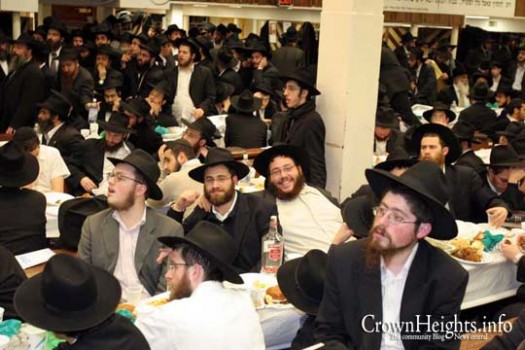
Weekly Story: A Takeaway From Yud Shevat
by Rabbi Sholom DovBer Avtzon
I am pleased to inform you that Bezras Hashem, the Biography on the Rebbe Rashab is now available in all local bookstores. In response to the many inquiries, I have begun researching and writing a biography of the Frierdiker Rebbe, and I expect it to be two volumes.
I would like to express my sincere appreciation, to all those who assisted in the research and to those who generously sponsored towards covering part of the enormous production costs. May the zechus of the Rebbe Rashab stand for them and may Hashem fulfill all of their hearts desires in an overflowing measure.
As always your feedback is greatly appreciated.
Over the past few weeks, we discussed various aspects of making the preparation for Yud Shevat. Indeed there were numerous farbrengens in every community of Anash. Additionally, there were many zoom farbrengens before and after shabbos.
But just as after Tishrei, we say v’yaakov hulach lidarkoi, and you take from Tishrei the nourishment it supplies for the whole year, so too now we have to have a takeaway.
With that in mind, I would like to share something I heard via zoom from Rabbi Mendel Gordon, in the name of his father in law, the mazkir, Reb Binyomin Klein, who said the following to the bochurim in the yeshiva in the mid-’80s.
Just imagine, the Rebbe called you into his room and said to you, “I have a special mission for you to do tomorrow. Tomorrow at 2:30 in the afternoon, you are to stand by a certain landmark in Manhattan, and for the next hour, you are to repeat a certain chapter of Tanya, or learn anything you desire,[ or even if the Rebbe tells you just to stand there and do or think of something], at 3:30, you are to return to me and inform me, mission accomplished.”
Tell me, continued Reb Binyomin, what thoughts would be going through your mind for the next twenty-four hours. Most probably you would feel the tremendous zechus (merit) that for some reason, from all of his chassidim, the Rebbe just chose you. You also understand that together with this honor comes the tremendous responsibility, there is no one else to rely on, but for you yourself.
Additionally, what time would you come there? Would you pull up around 3:30 or would you make sure that you arrive there with time to spare?
Your mind might wander and come up with thoughts of what mystical reason is behind this. Perhaps you will think about the famous story when the Baal Shem Tov sent Reb Chaim rapport on a special mission, and only after he overcame tremendous challenges, was he informed of what he accomplished there,
Now each and every one of you and all of us should realize, that we are that person. The only difference is that that person was given a mystical or exotic mission, and we were given a simple mission. You are a bochur in yeshiva, you are to follow the schedule that the Rebbeim established. You are supposed to learn the syllabus that the yeshiva set forward. Andyes, there will be a time when you have to give an honest cheshbon.
Additionally, if you are a baal habayis, who is obligated to work to support your family,, nevertheless, you must have set times to learn something, in addition to learning Chitas and Rambam, and become involved in the mivtzoyim.
Yes, it may not be a sensational and mystical mission, but it is your mission!
In that farbrengen, various mashpiim were elucidating different aspects of the Rebbe’s sichos from Yud Shevat 5711, when he officially assumed becoming Rebbe, (the leadership).
With that in mind, I would like to point out a point.
One of the aspects that the Rebbe stressed in that farbrengen, is that the Neshoma of a tzaddik is vibrant even after their histalkus. Therefore, on Chof Cheshvan 570s, the Rebbe Rashab came to his son in a vision, and recited a maamar on the chapter Tehillim, corresponding to the years since he was born, even though this was twenty-three years after his histalkus!
The Rebbe was pointing out that the neshoma of a tzaddik is always vibrant, and even after their histalkus, one can be connected. Furthermore, since a tzaddik never rests, but continuously becomes higher and higher; therefore your connection can be stronger.
I will try to explain this through a story:
Once the Maharil (the second oldest son of the Rebbe the Tzemach Tzedek) said to the Rebbe Maharash, who was over twenty years younger than he, “How is it that you know more than I, when I am older than you?”
The Rebbe Maharash replied, You are older in our years, but I am older in Fathers years,. Meaning, although we have the same parents, I was born, when they were on a higher level than they were when you were born, so I received a stronger dosage of his wisdom etc. than you did.”
So to those that became connected to the Rebbe after Gimmel Tammuz, your connection begins from that high level.
May we all strengthen our hiskashrus to the Rebbe.
This week’s post is in the zechus and anticipation of a speedy and complete recovery for my sister, Chaya Rivkah bas Cheyena and all who are in need of a brocha.
Rabbi Avtzon is a veteran mechanech and the author of numerous books on the Rebbeim and their chassidim. He can be contacted at avtzonbooks@gmail.com














